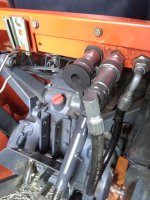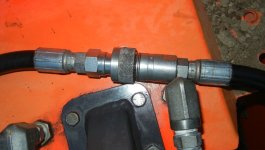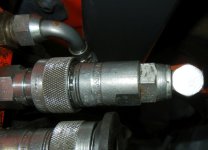mustangfarm
Member
- Joined
- Jun 20, 2018
- Messages
- 49
- Tractor
- L3400
I have a new to me L3400 with a Bradco backhoe.. There were no leaks or anything that I know about until this past week when I disconnected the backhoe.
The tractor has a male and female quick connect at the back where the 2 backhoe hoses connect.
When the backhoe is off there is a short hose coming out of a 3rd port on the aux block with a female coupler that hooks back to return the fluid.
So my problem is that regardless if I have the loop/bypass hose hooked to the tractor OR the backhoe female hose , the coupler drips constantly.
I have tried cleaning everything but still drips. The fitting on the tractor is male and all the orings and moving parts seem to be in the female side. Seems odd that
both the backhoe female fitting AND the Bypass fitting would both have bad orings , doesn't it?? The drip is enough to soak a rag in 5-10 min of use. (I tied a rag around the dripping fittings)
Another question is when the backhoe is off, I connected it's 2 hoses to each other, thinking that would keep the ends clean as it sits in the yard. That connection is now dripping as well.
I guess that makes sense since it is the same female end that was dripping on the tractor. Should I be looping them to each other in storage like this or is that a bad idea?
Also when you connect/disconnect these fittings, is it normal to get a dribble of fluid out? I have tried moving the levers around before doing so to relieve pressure but I always get a dribble.
My last question has to do with the safety of this fluid that is leaking? Is this basically the same sort of thing as ATF from my car in terms of toxicity/handling? I got it all over myself and I am sure some drips have reached the ground. I have read horror stories of people getting poisoned by hydraulic fluid.
thanks for any guidance.
The tractor has a male and female quick connect at the back where the 2 backhoe hoses connect.
When the backhoe is off there is a short hose coming out of a 3rd port on the aux block with a female coupler that hooks back to return the fluid.
So my problem is that regardless if I have the loop/bypass hose hooked to the tractor OR the backhoe female hose , the coupler drips constantly.
I have tried cleaning everything but still drips. The fitting on the tractor is male and all the orings and moving parts seem to be in the female side. Seems odd that
both the backhoe female fitting AND the Bypass fitting would both have bad orings , doesn't it?? The drip is enough to soak a rag in 5-10 min of use. (I tied a rag around the dripping fittings)
Another question is when the backhoe is off, I connected it's 2 hoses to each other, thinking that would keep the ends clean as it sits in the yard. That connection is now dripping as well.
I guess that makes sense since it is the same female end that was dripping on the tractor. Should I be looping them to each other in storage like this or is that a bad idea?
Also when you connect/disconnect these fittings, is it normal to get a dribble of fluid out? I have tried moving the levers around before doing so to relieve pressure but I always get a dribble.
My last question has to do with the safety of this fluid that is leaking? Is this basically the same sort of thing as ATF from my car in terms of toxicity/handling? I got it all over myself and I am sure some drips have reached the ground. I have read horror stories of people getting poisoned by hydraulic fluid.
thanks for any guidance.


